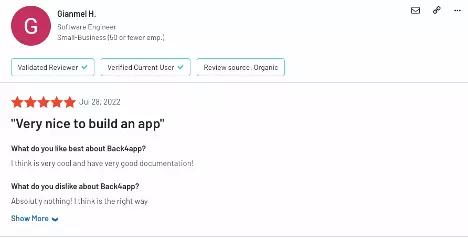Back4App vs Heroku Comparison
This article will examine the similarities and differences between Back4App and Heroku. It will summarize both platforms and explore the core features and pricing models.
Contents
Overview of Back4App and Heroku
Back4App and Heroku are considered managed cloud solutions. Users can utilize both platforms to create applications faster and scale without handling complicated infrastructure.
The core differences between Back4App and Heroku lean on the subsequent variables:
- Open Source vs. Closed Source
- Pricing model
- Feature Set
- Easy-of-use
- Deployment Options
- Support Levels
Back4App vs Heroku | Comparison Table
| Back4app | Heroku | |
| Description | Low-code backend to build modern applications | Platform as a service to build, run, and scale app in the cloud |
| Date Founded | 2015 | 2006 |
| Technology | Open-Source | Closed-Source |
| Features | Less comprehensive | More comprehensive |
| Application Types | Mobile Apps / Web Apps | Mobile Apps / Web Apps |
| Easy-of-use | Very Easy | More complex |
| Pricing Structure | Simple, predictable, few variables | Complex and more variables to control |
| Free Tier | Yes | No |
| Enterprise Plans | Yes | Yes |
| Deployment options | AWS, Google Cloud, Azure, and On-Premises | AWS |
| Dedicated Hosting | Yes | Yes |
| Support Levels | Community Emails Tickets Slack Calls The support is flexible depending on the plan. | Support site Tickets The support is flexible depending on the plan. |
| Support Availability | 24/07 | Standard Support – 12×5 Premium Support – 24×07 |
| GDPR | Yes | Yes |
| Regions | USA, Europe, Asia, Australia, Middle East | USA/Europe (other regions are only available on the Private Spaces offering) |
Open-Source vs. Closed Source
Back4App founded its platform on open-source technologies and is an open-source alternative to Heroku. It works with open-source projects like NodeJS, GraphQL, Redis, etc. Also, Back4App will release the container-platform project on GitHub as soon as the first version is stable.
On the other hand, Heroku is a proprietary technology from Salesforce. Some modules like React-refetch, 12factor, and the legacy-cli are available on GitHub.
Pricing Structure
Back4App’s pricing structure is straightforward and predictable. It delivers a free tier ideal for development purposes, a $7/month entry-level plan great for MVPs, and Dedicated resources for scaling an application.
Heroku will no longer offer a free tier after November 28, 2022. The paid plans start at $7/month for Dynos and $9/month for data services.
Privacy & Security
Safeguarding user privacy is vital to Back4App. According to our Privacy Policy, we do not market your data and only use it for R&D, improving the product and services, internal marketing, and administrative goals.
According to Heroku’s security page, “Nothing is more important to our company than the privacy of our customer’s data.” Also, Heroku complies with multiple security assessments, such as, ISO 270001, PCI, SOX, etc.
Feature Set
Back4App is a comprehensive app development platform that encompasses two products.
The backend as a service offering includes features like a real-time database, REST and GraphQL APIs, Edge Functions, Notifications, and Storage.
The container platform offering includes features like an out-of-the-box GitHub integration, a fully-managed infrastructure, and Docker image deployment.
Comparing Heroku to Back4App, the Heroku platform delivers a more comprehensive feature set and contains resources related to computing resources, managed databases, and continuous integration.
| Back4App | Heroku | |
| Backend as a Service | X | – |
| Container Platform | X | X |
| Managed Databases | – | X |
| GitHub Integration | X | X |
Generally speaking, Heroku will offer a more comprehensive set of features related to Platform as Service components. On the other hand, Back4App decided to excel and provide a best-in-class experience on a restricted number of features and focus on Docker and Node.JS technologies.
Easy-of-use
Utilizing Back4App is simple! You can build a backend or deploy a container in less than 2 minutes.

Heroku is a more complicated platform in comparison to Back4App. Users say there could be a better organization of applications on the dashboard, splitting the applications by customer.
Deployment Options
Back4App offers three deployment options:
- AWS cloud hosting for shared resources
- Multiple cloud hosting for dedicated resources
- On-premise hosting
Heroku hosts its infrastructure within AWS’s secure data centers and deploys regular applications in the USA or Europe (other options available on Private Spaces).
Support Levels
Both Back4app and Heroku offer the following support channels:
- Community
- Tickets
Heroku’s around-the-clock support is only available for Premium Support. The Standard Support covers a 12×5 window.
Conclusion
This article explained the similarities and differences between Back4App and Heroku.
Back4App and Heroku are conceived to speed-up app development, decrease time to market, and scale apps without infrastructure hassles.
The fundamental differences are open-source technologies, feature sets, pricing models, and cloud deployment options.
To discover more about Back4App, please read Why Users Love Back4App. For more information about Heroku, please read Heroku Secrets Unlocked.
FAQ
What are the fundamental differences between Back4App and Heroku?
– Back4App operates with open-source technologies
– Heroku is a proprietary technology from Salesforce
– Back4App has a more laser-focused feature set
– Heroku has a more comprehensive feature set
– Back4App pricing is straightforward and predictable
– Heroku pricing is more sophisticated and complex
– Back4App offers multi-cloud and on-premise deployment options
– Heroku offers a AWS deployment option



